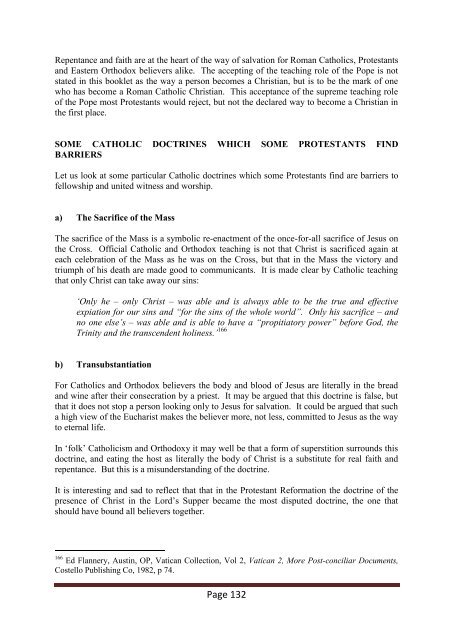Digging Out the Embedded Church - The Maranatha Community
Digging Out the Embedded Church - The Maranatha Community
Digging Out the Embedded Church - The Maranatha Community
You also want an ePaper? Increase the reach of your titles
YUMPU automatically turns print PDFs into web optimized ePapers that Google loves.
Repentance and faith are at <strong>the</strong> heart of <strong>the</strong> way of salvation for Roman Catholics, Protestants<br />
and Eastern Orthodox believers alike. <strong>The</strong> accepting of <strong>the</strong> teaching role of <strong>the</strong> Pope is not<br />
stated in this booklet as <strong>the</strong> way a person becomes a Christian, but is to be <strong>the</strong> mark of one<br />
who has become a Roman Catholic Christian. This acceptance of <strong>the</strong> supreme teaching role<br />
of <strong>the</strong> Pope most Protestants would reject, but not <strong>the</strong> declared way to become a Christian in<br />
<strong>the</strong> first place.<br />
SOME CATHOLIC DOCTRINES WHICH SOME PROTESTANTS FIND<br />
BARRIERS<br />
Let us look at some particular Catholic doctrines which some Protestants find are barriers to<br />
fellowship and united witness and worship.<br />
a) <strong>The</strong> Sacrifice of <strong>the</strong> Mass<br />
<strong>The</strong> sacrifice of <strong>the</strong> Mass is a symbolic re-enactment of <strong>the</strong> once-for-all sacrifice of Jesus on<br />
<strong>the</strong> Cross. Official Catholic and Orthodox teaching is not that Christ is sacrificed again at<br />
each celebration of <strong>the</strong> Mass as he was on <strong>the</strong> Cross, but that in <strong>the</strong> Mass <strong>the</strong> victory and<br />
triumph of his death are made good to communicants. It is made clear by Catholic teaching<br />
that only Christ can take away our sins:<br />
„Only he – only Christ – was able and is always able to be <strong>the</strong> true and effective<br />
expiation for our sins and “for <strong>the</strong> sins of <strong>the</strong> whole world”. Only his sacrifice – and<br />
no one else‟s – was able and is able to have a “propitiatory power” before God, <strong>the</strong><br />
Trinity and <strong>the</strong> transcendent holiness.‟ 166<br />
b) Transubstantiation<br />
For Catholics and Orthodox believers <strong>the</strong> body and blood of Jesus are literally in <strong>the</strong> bread<br />
and wine after <strong>the</strong>ir consecration by a priest. It may be argued that this doctrine is false, but<br />
that it does not stop a person looking only to Jesus for salvation. It could be argued that such<br />
a high view of <strong>the</strong> Eucharist makes <strong>the</strong> believer more, not less, committed to Jesus as <strong>the</strong> way<br />
to eternal life.<br />
In „folk‟ Catholicism and Orthodoxy it may well be that a form of superstition surrounds this<br />
doctrine, and eating <strong>the</strong> host as literally <strong>the</strong> body of Christ is a substitute for real faith and<br />
repentance. But this is a misunderstanding of <strong>the</strong> doctrine.<br />
It is interesting and sad to reflect that that in <strong>the</strong> Protestant Reformation <strong>the</strong> doctrine of <strong>the</strong><br />
presence of Christ in <strong>the</strong> Lord‟s Supper became <strong>the</strong> most disputed doctrine, <strong>the</strong> one that<br />
should have bound all believers toge<strong>the</strong>r.<br />
166 Ed Flannery, Austin, OP, Vatican Collection, Vol 2, Vatican 2, More Post-conciliar Documents,<br />
Costello Publishing Co, 1982, p 74.<br />
Page 132








